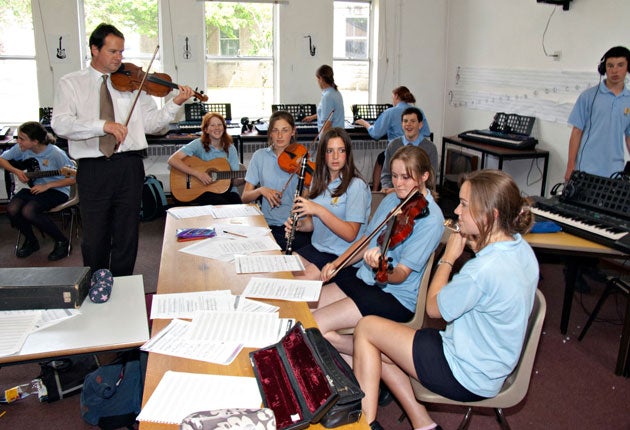U-turn by Gove saves music teaching – for now

Music education in state schools is "like an unsatisfactory weather forecast – good in places but distinctly patchy", according to a government review of the subject published yesterday.
The review, headed by Darren Henley, managing director of Classic FM radio station, expressed concern over the "patchiness" in provision.
It succeeded in persuading Education Secretary Michael Gove to retain the £82.5m ringfenced funding for school music for a further year. Without that, Mr Henley's review warned, he would have "serious concerns about the future of music education".
"Given the financial pressures on both local authorities and individual schools, it is important that the money intended for music education is actually spent on music education," he added. "Ringfencing this funding appears to be the only way to ensure that this happens."
The decision by Mr Gove to continue with ringfenced funding represents a change in policy. Previously, it had been left to individual heads as to how they should spend their budgets, a policy that came under fire when cash for sport was axed (and later partially reprieved) in the autumn.
Mr Gove pledged to end the "musical divide" between wealthier children with access to great musical education and children in disadvantaged areas. "Music has the power to touch the soul," said Mr Gove.
"But access to the best musical education is not universal and the opportunity to benefit from great instrumental teaching is not shared equally. Many disadvantaged children are denied the music education they deserve."
As a result of the review, the Government will publish a national plan for the future of music education later this year. One of the issues it will consider is whether means-testing should be introduced to determine who should pay for tuition. At present, funding is split between the Government, local authorities and parents, but the initial period is free. After that, charges can be applied with schools expected to have a policy to help families on low income.
However, the report believes there should be a "clear progression" for provision after the initial period. This is expected to involve means testing.
The review stressed the importance of keeping music as a compulsory subject on the national curriculum. "Without the obligation for music lessons to be a part of the school curriculum, there is a very real concern that the subject might well wither away in many schools – and in the worst-case scenario, could all but disappear in others," it said.
Mr Henley warned there was evidence the importance of music education "is not shared in every local authority across the country".
A survey by the Federation of Music Services last month revealed that one in three local authorities (34 per cent) had issued redundancy notices to music staff. Virginia Haworth-Galt, chief executive of the FMA, said yesterday: "We urge all local authorities to continue their financial support."
Join our commenting forum
Join thought-provoking conversations, follow other Independent readers and see their replies
Comments
Bookmark popover
Removed from bookmarks